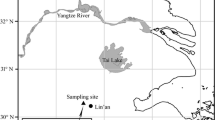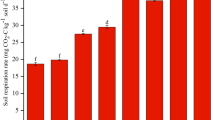Abstract
Purpose
Long-term intensive cultivation and heavy fertilization improve the nutritional conditions in acidic Ultisols, but also sharply accelerate soil acidification. However, the impact of such dramatic environmental changes on soil microorganisms is unclear. The aims of this work were to investigate the responses of microbial community composition and metabolic function to long-term fertilization, and to determine the key factors that primarily drive microbial changes in acidic Ultisols.
Materials and methods
A long-term fertilization experiment under a winter wheat–summer maize rotation was established in 1990 in acidic Ultisols of southern China. Soils were collected from four treatments in June 2014: (1) non-fertilization control (CK); (2) only N fertilization (N); (3) N, P, and K fertilization (NPK); and (4) NPK plus manure (NPKM; 70% of total N obtained from manure). The amount of N used in all N treatments was 300 kg N ha−1 year−1. The soil pH, cation exchange capacity (CEC), soil organic carbon (SOC), total nitrogen (TN), phosphorus (TP) and potassium (TK), available nitrogen (AN), phosphorus (AP), and potassium (AK) were measured. Soil microbial community composition and metabolic function were determined by phospholipid fatty acids analysis (PLFA) and community-level physiological profile (CLPP) method, respectively.
Results and discussion
Compared with CK, NPKM significantly increased total PLFA biomass and average well color development (AWCD); NPK increased total PLFA biomass by 2.2 times, but its AWCD was not significantly different from CK, indicating that microbial metabolic efficiency in NPK decreased. N decreased total PLFA biomass by 27.9%, while almost completely inhibiting metabolic activity. NPKM maintained microbial functional diversity indexes at similar levels as CK, while NPK and N significantly decreased microbial functional diversity indexes. Redundancy analysis (RDA) revealed that soil microbial community composition and metabolic pattern were more stably maintained by application of manure compared to chemical fertilizers. Soil pH showed the primary effect on microbial community composition, metabolic activity, and functional diversity indexes.
Conclusions
This research demonstrated that the negative effects of Ultisol acidification induced by long-term application of chemical N fertilizer on microorganisms overwhelmed the positive effects of soil nutrition improvement. The inhibiting effect of serious acidification on microbial metabolic function was stronger than that on community composition. Microorganisms live in a low active metabolic state to resist serious Ultisols acidification. Therefore, fertilization in acidic Ultisols should be based on the premise of preventing soil further acidification.





Similar content being viewed by others
References
Abdulahaal BM, Li JY, Xu CY, Mehmood K, Xu RK (2017) Determination of critical pH and Al concentration of acidic Ultisols for wheat and canola crops. Solid Earth 8:149–159
Allison SD, Martiny JB (2008) Resistance, resilience, and redundancy in microbial communities. Proc Natl Acad Sci U S A 105(Supplement 1):11512–11519. https://doi.org/10.1073/pnas.0801925105
Berg G (2009) Plant-microbe interactions promoting plant growth and health: perspectives for controlled use of microorganisms in agriculture. Appl Microbiol Biot 84(1):11–18. https://doi.org/10.1007/s00253-009-2092-7
Birgander J, Reischke S, Jones DL, Rousk J (2013) Temperature adaptation of bacterial growth and 14C-glucose mineralisation in a laboratory study. Soil Biol Biochem 65:294–303. https://doi.org/10.1016/j.soilbio.2013.06.006
Blanchet FG, Legendre P, Borcard D (2008) Forward selection of explanatory variables. Ecology 89:2623–2632
Buyer JS, Teasdale JR, Roberts DP, Zasada IA, Maul JE (2010) Factors affecting soil microbial community structure in tomato cropping systems. Soil Biol Biochem 42(5):831–841. https://doi.org/10.1016/j.soilbio.2010.01.020
Cai ZJ, Wang BR, Xu MG, Zhang HM, He XH, Zhang L, Gao SD (2015) Intensified soil acidification from chemical N fertilization and prevention by manure in an 18-year field experiment in the red soil of southern China. J Soils Sediments 15(2):260–270. https://doi.org/10.1007/s11368-014-0989-y
Cai ZJ, Wang BR, Xu MG, Zhang HM, Zhang L, Gao SD (2014) Nitrification and acidification from urea application in red soil (Ferralic Cambisol) after different long-term fertilization treatments. J Soils Sediments 14(9):1526–1536. https://doi.org/10.1007/s11368-014-0906-4
Chen L, Xun WB, Sun L, Zhang N, Shen QR, Zhang RF (2014) Effect of different long-term fertilization regimes on the viral community in an agricultural soil of southern China. Eur Soil Bio 62:121–126. https://doi.org/10.1016/j.ejsobi.2014.03.006
Chen XF, Li ZP, Liu M, Jiang CY, Che YP (2015) Microbial community and functional diversity associated with different aggregate fractions of a paddy soil fertilized with organic manure and/or NPK fertilizer for 20 years. J Soils Sediments 15(2):292–301. https://doi.org/10.1007/s11368-014-0981-6
Dong WY, Zhang XY, Wang HM, Dai XQ, Sun XM, Qiu WW, Yang FT (2012) Effect of different fertilizer application on the soil fertility of paddy soils in red soil region of southern China. PLoS One 7(9):e44504. https://doi.org/10.1371/journal.pone.0044504
Dorea CC, Clarke BA (2008) Effect of aluminium on microbial respiration. Water Air Soil Pollut 189(1-4):353–358. https://doi.org/10.1007/s11270-007-9553-3
Fanin N, Hättenschwiler S, Fromin N (2014) Litter fingerprint on microbial biomass, activity, and community structure in the underlying soil. Plant Soil 379:79–91
Fierer N, Schimel JP, Holden PA (2003) Variations in microbial community composition through two soil depth profiles. Soil Biol Biochem 35(1):167–176. https://doi.org/10.1016/S0038-0717(02)00251-1
Garland JL (1996) Analytical approaches to the characterization of samples of microbial communities using patterns of potential C source utilization. Soil Biol Biochem 28(2):213–221. https://doi.org/10.1016/0038-0717(95)00112-3
Gerke J (2010) Humic (organic matter)-Al (Fe)-phosphate complexes: an underestimated phosphate form in soils and source of plant-available phosphate. Soil Sci 175(9):417–425. https://doi.org/10.1097/SS.0b013e3181f1b4dd
Guo JH, Liu XJ, Zhang Y, Shen JL, Han WX, Zhang WF, Christie P, Goulding KW, Vitousek PM, Zhang FS (2010) Significant acidification in major Chinese croplands. Science 327(5968):1008–1010. https://doi.org/10.1126/science.1182570
Hammesfahr U, Heuer H, Manzke B, Smalla K, Thielebruhn S (2008) Impact of the antibiotic sulfadiazine and pig manure on the microbial community structure in agricultural soils. Soil Biol Biochem 40:1583–1591
Hartman WH, Richardson CJ, Vilgalys R, Bruland GL (2008) Environmental and anthropogenic controls over bacterial communities in wetland soils. Proc Natl Acad Sci U S A 105(46):17842–17847. https://doi.org/10.1073/pnas.0808254105
Hu XJ, Liu JJ, Wei D, Zhu P, Cui XA, Zhou BK, Chen XL, Jin J, Liu XB, Wang GH (2017) Effects of over 30-year of different fertilization regimes on fungal community compositions in the black soils of northeast China. Agric Ecosyst Environ 248:113–122. https://doi.org/10.1016/j.agee.2017.07.031
Huang R, Wu YC, Zhang JB, Zhong WH, Jia ZJ, Cai ZC (2012) Nitrification activity and putative ammonia-oxidizing archaea in acidic red soils. J Soils Sediments 12(3):420–428. https://doi.org/10.1007/s11368-011-0450-4
Huang S, Zhang W, Yu X, Huang QR (2010) Effects of long-term fertilization on corn productivity and its sustainability in an Ultisol of southern China. Agric Ecosyst Environ 138(1-2):44–50. https://doi.org/10.1016/j.agee.2010.03.015
Kušlienė G, Rasmussen J, Kuzyakov Y, Eriksen J (2014) Medium-term response of microbial community to rhizodeposits of white clover and ryegrass and tracing of active processes induced by 13C and 15N labelled exudates. Soil Biol Biochem 76:22–33. https://doi.org/10.1016/j.soilbio.2014.05.003
Lauber CL, Hamady M, Knight R, Fierer NP (2009) Pyrosequencing-based assessment of soil pH as a predictor of soil bacterial community structure at the continental scale. Appl Environ Microb 75(15):5111–5120. https://doi.org/10.1128/AEM.00335-09
Legendre P, Gallagher E (2001) Ecologically meaningful transformations for ordination of species data. Oecologia 129(2):271–280. https://doi.org/10.1007/s004420100716
Lennon JT, Jones SE (2011) Microbial seed banks: the ecological and evolutionary implications of dormancy. Nat Rev Microbiol 9(2):119–130. https://doi.org/10.1038/nrmicro2504
Li WT, Liu M, Jiang CY, Wu M, Chen XF, Ma XY, Li ZP (2017) Changes in soil aggregate- associated enzyme activities and nutrients under long-term chemical fertilizer applications in a phosphorus-limited paddy soil. Soil Use Manage 33(1):25–33. https://doi.org/10.1111/sum.12322
Ma XY, Liu M, Li ZP (2015) Changes in microbial properties and community composition in acid soils receiving wastewater from concentrated animal farming operations. Appl Soil Ecol 90:11–17
Ma XY, Liu M, Li ZP (2016) Shifts in microbial biomass and community composition in subtropical paddy soils under a gradient of manure amendment. Biol Fert. Soils 52:775–787
National Bureau of Statistics of China (2016) China statistical yearbook. China Statistics Press, Beijing
Pansu M, Gautheyrou J (2006) Handbook of soil analysis: mineralogical, organic and inorganic methods. Springer, Berlin Heidelberg, Berlin. https://doi.org/10.1007/978-3-540-31211-6
Peng CJ, Lai SS, Luo XS, Lu JW, Huang QY, Chen WL (2016) Effects of long term rice straw application on the microbial communities of rapeseed rhizosphere in a paddy-upland rotation system. Sci Total Environ 557-558:231–239. https://doi.org/10.1016/j.scitotenv.2016.02.184
Rittershaus ESC, Baek SH, Sassetti CM (2013) The normalcy of dormancy: common themes in microbial quiescence. Cell Host Microbe 13(6):643–651. https://doi.org/10.1016/j.chom.2013.05.012
Rousk J, Bååth E, Brookes PC, Lauber CL, Lozupone C, Caporaso JG, Knight R, Fierer N (2010) Soil bacterial and fungal communities across a pH gradient in an arable soil. ISME J 4(10):1340–1351. https://doi.org/10.1038/ismej.2010.58
Rukshana F, Butterly CR, Xu JM, Baldock JA, Tang CX (2014) Organic anion-to-acid ratio influences pH change of soils differing in initial pH. J Soils Sediments 14(2):407–414. https://doi.org/10.1007/s11368-013-0682-6
Shen CC, Xiong JB, Zhang HY, Feng YZ, Lin XG, Li XY, Liang WJ, Chu HY (2013) Soil pH drives the spatial distribution of bacterial communities along elevation on Changbai Mountain. Soil Biol Biochem 57:204–211. https://doi.org/10.1016/j.soilbio.2012.07.013
Sistla SA, Schimel JP (2012) Stoichiometric flexibility as a regulator of carbon and nutrient cycling in terrestrial ecosystems under change. New Phytol 196(1):68–78. https://doi.org/10.1111/j.1469-8137.2012.04234.x
Six J, Frey SD, Thiet RK, Batten KM (2006) Bacterial and fungal contributions to carbon sequestration in agroecosystems. Soil Sci Soc Am J 70(2):555–569. https://doi.org/10.2136/sssaj2004.0347
Sun RB, Zhang XX, Guo XS, Wang DZ, Chu HY (2015) Bacterial diversity in soils subjected to long-term chemical fertilization can be more stably maintained with the addition of livestock manure than wheat straw. Soil Biol Biochem 88:9–18. https://doi.org/10.1016/j.soilbio.2015.05.007
Treseder KK (2008) Nitrogen additions and microbial biomass: a meta-analysis of ecosystem studies. Ecol Lett 11(10):1111–1120. https://doi.org/10.1111/j.1461-0248.2008.01230.x
Ulrich B (1986) Natural and anthropogenic components of soil acidification. J Plant Nutr Soil Sci 149:702–717
Waldrop M, Firestone M (2004) Microbial community utilization of recalcitrant and simple carbon compounds: impact of oak-woodland plant communities. Oecologia 138(2):275–284. https://doi.org/10.1007/s00442-003-1419-9
Xiang XJ, He D, He JS, Myrold DD, Chu HY (2017) Ammonia-oxidizing bacteria rather than archaea respond to short-term urea amendment in an alpine grassland. Soil Biol Biochem 107:218–225. https://doi.org/10.1016/j.soilbio.2017.01.012
Xun WB, Huang T, Zhao J, Ran W, Wang BR, Shen QR, Zhang RF (2015) Environmental conditions rather than microbial inoculum composition determine the bacterial composition, microbial biomass and enzymatic activity of reconstructed soil microbial communities. Soil Biol Biochem 90:10–18. https://doi.org/10.1016/j.soilbio.2015.07.018
Yuan JH, Xu RK, Qian W, Wang RH (2011) Comparison of the ameliorating effects on an acidic ultisol between four crop straws and their biochars. J Soils Sediments 11(5):741–750. https://doi.org/10.1007/s11368-011-0365-0
Yue XL, Zhang JG, Shi AD, Yao SH, Zhang B (2016) Manure substitution of mineral fertilizers increased functional stability through changing structure and physiology of microbial communities. Eur J Soil Biol 77:34–43. https://doi.org/10.1016/j.ejsobi.2016.10.002
Zelles L (1997) Phospholipid fatty acid profiles in selected members of soil microbial communities. Chemosphere 35(1-2):275–294. https://doi.org/10.1016/S0045-6535(97)00155-0
Zhang Q, Zhou W, Liang GQ, Sun JW, Wang XB, He P (2015) Distribution of soil nutrients, extracellular enzyme activities and microbial communities across particle-size fractions in a long-term fertilizer experiment. Appl Soil Ecol 94:59–71. https://doi.org/10.1016/j.apsoil.2015.05.005
Zhang XB, Wu LH, Sun N, Ding XS, Li JW, Wang BR, Li DC (2014) Soil CO2 and N2O emissions in maize growing season under different fertilizer regimes in an upland red soil region of South China. J Integr Agr 13(3):604–614. https://doi.org/10.1016/S2095-3119(13)60718-2
Zhong WH, Gu T, Wei W, Zhang B, Lin XG, Huang QR, Shen WS (2010) The effects of mineral fertilizer and organic manure on soil microbial community and diversity. Plant Soil 326(1-2):511–522. https://doi.org/10.1007/s11104-009-9988-y
Acknowledgements
This study is supported by the National Basic Research Program (973 Program) of China (No. 2014CB441003) and the National Natural Science Foundation of China (Nos. 41661052 and 31660599). In addition, we thank the anonymous reviewers and editors for their helpful comments regarding the manuscript.
Author information
Authors and Affiliations
Corresponding author
Additional information
Responsible editor: Huaiying Yao
Electronic supplementary material
ESM 1
(DOC 62 kb)
Rights and permissions
About this article
Cite this article
Liu, J., Liu, M., Wu, M. et al. Soil pH rather than nutrients drive changes in microbial community following long-term fertilization in acidic Ultisols of southern China. J Soils Sediments 18, 1853–1864 (2018). https://doi.org/10.1007/s11368-018-1934-2
Received:
Accepted:
Published:
Issue Date:
DOI: https://doi.org/10.1007/s11368-018-1934-2




